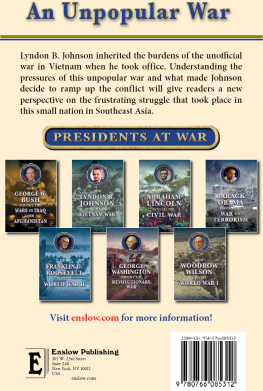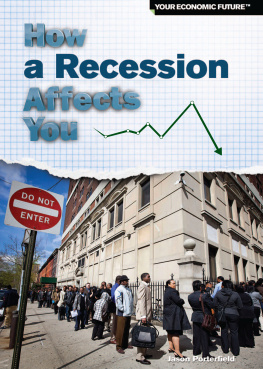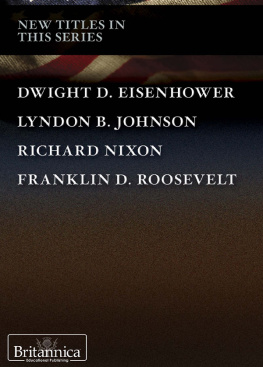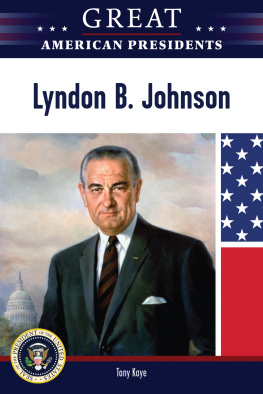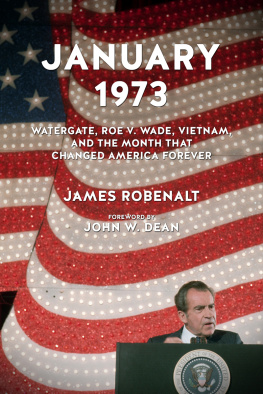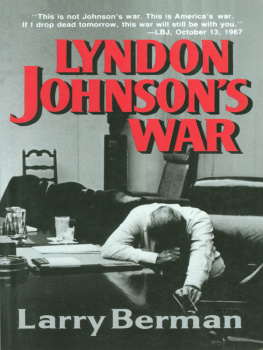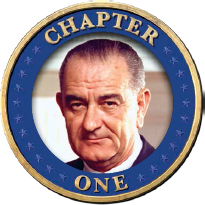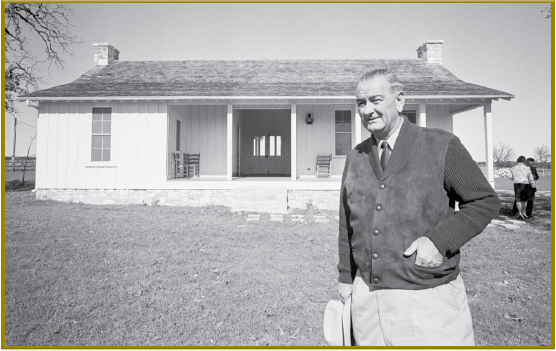Published in 2018 by Enslow Publishing, LLC.
101 W. 23rd Street, Suite 240, New York, NY 10011
Copyright 2018 by Enslow Publishing, LLC.
All rights reserved.
No part of this book may be reproduced by any means without the written permission of the publisher.
Library of Congress Cataloging-in-Publication Data
Names: Porterfield, Jason, author.
Title: How Lyndon B. Johnson fought the Vietnam War /Jason Porterfield.
Description: New York, NY : Enslow Publishing, 2018. |
Series: Presidents at war | Includes bibliographical references and index. | Audience: Grades 712.
Identifiers: LCCN 2017007006 | ISBN 9780766085312 (library bound)
Subjects: LCSH: Johnson, Lyndon B. (Lyndon Baines), 19081973Military leadershipJuvenile literature. | Vietnam War, 19611975United States Juvenile literature. | PresidentsUnited StatesBiographyJuvenile literature. | United StatesPolitics and government19631969Juvenile literature. | United StatesForeign relations19631969Juvenile literature.
Classification: LCC E847.2 .P67 2018 | DDC 973.923092dc23
LC record available at https://lccn.loc.gov/2017007006
Printed in the United States of America
To Our Readers: We have done our best to make sure all website addresses in this book were active and appropriate when we went to press. However, the author and the publisher have no control over and assume no liability for the material available on those websites or on any websites they may link to. Any comments or suggestions can be sent by e-mail to .
Photo Credits: Cover, pp. Education Images/Universal Images Group/Getty Images.
INTRODUCTION
CHAPTER 1 GROWING INTO POLITICS
CHAPTER 2 A NATION IN CONFLICT
CHAPTER 3 ESCALATION IN ASIA
CHAPTER 4 ASSESSING VIETNAM
CHAPTER 5 THE MIDDLE COURSE
CHAPTER 6 SHIFTING MOMENTUM
CHAPTER 7 SPINNING OUT OF CONTROL
CHAPTER 8 PASSING THE BATON
CONCLUSION
CHRONOLOGY
CHAPTER NOTES
GLOSSARY
FURTHER READING
INDEX
INTRODUCTION
I n the decades following the end of World War II (1939 1945), the United States and the Union of Soviet Socialist Republics (Soviet Union) were locked in a struggle to spread their own forms of government to other parts of the world. The Soviet Union wanted to expand its influence by helping to spread communism. The US worked to keep it in check by helping to set up young democracies. This bloodless struggle was called the Cold War, and it lasted from 1947 until the collapse of the Soviet Union in 1991.
The Soviet Union and the United States never fought each other directly, but took opposing sides in many smaller struggles. During the 1950s, the two nations became involved in a struggle that started out as a war for independence and then turned into a civil war in the divided Southeast Asian nation of Vietnam. What began as the US sending funds and military advisors eventually evolved into a full-scale war.
Texas-born Lyndon Baines Johnson (19081973) was president of the United States from 1963 to 1969, the years during which the US became deeply involved in Vietnam. He oversaw the development of the US militarys strategy in the war. Reluctant to fully commit to the war but believing it was necessary to prevent communism from spreading throughout Asia, he sent hundreds of thousands of soldiers into Vietnam even after things began going badly.
Lyndon Johnson speaks with reporters outside the LBJ Ranch in Johnson City, Texas. Johnsons presidency was marked by the Vietnam War and social upheaval.
Ultimately, the war became one of the longest and costliest conflicts in US history. It cost the lives of more than 58,000 US soldiers, as well as millions of Vietnamese soldiers and civilians. Tensions over the war and race relations in the US boiled over into protests and even riots during Johnsons presidency as the fighting continued.
Johnsons legacy as president is largely defined by Vietnam and his inability to get the US out of the war. He was much more than that. A skilled politician, he used his energy and charisma to rise to positions of power in the Senate. A plain-speaking and physically imposing man, he was able to effectively charm, prod, and bully his colleagues into passing important civil rights legislation. When he became president, he used these same skills to push through more effective civil rights laws and important social programs designed to help lift people out of poverty.
The war that he failed to avoid lasted beyond his presidency and did not end until after his death in 1973. Even now, his war plans and US strategies in Vietnam are studied as experts work to understand how the US fell short of defeating a much more poorly equipped fighting force.
GROWING INTO POLITICS
L yndon Baines Johnson was born on August 27, 1908, in Stonewall, Texas. He was the oldest child of Rebekah Baines Johnson and Samuel Ealy Johnson, Jr. The couple would later have one more sonSam Houston Johnson and three daughtersRebekah, Josefa, and Lucia.
The Johnson family lived on a small ranch near the Pedernales River. The Johnson and Baines families had deep roots in that part of Texas. Rebekah Baines Johnsons grandfather was a Baptist minister who founded several churches in the area and went on to become president of Baylor University. Her father, Joseph Wilson Baines, served in the Texas state legislature and was secretary of state under Texas governor John Ireland. Before marrying, she studied literature at Baylor University, worked as an elocution teacher and wrote articles for local newspapers.
On his fathers side, a cousin was the namesake of a nearby small town called Johnson City. No matter where his career took him, Lyndon Johnson would maintain a strong connection to the region throughout his life.
The Johnson home was so small that the children had to share beds. After the family moved away, Lyndon Johnsons aunt bought the house and added rooms.
The Johnson family sometimes struggled for money. Samuel Johnson had worked as a barber and a school-teacher before becoming serious about working his familys farm. The farm was successful, but he lost money by speculating on the price of cotton and ended up deeply in debt be the time Lyndon was a teenager.
The Johnsons were a political family. Samuel Johnsons father, Samuel Ealy Johnson, Sr., was a member of the Texas State Legislature. In 1904, Samuel Johnson decided to follow in his fathers and his father-in-laws footsteps was elected to the Texas House of Representatives. He served there for six terms. Though he was a successful politician, his luck as a farmer and businessman did not improve and he lost the family farm in 1906. Lyndon Johnson later remembered his as impoverished, but happy. Like many homes in the rural United States at that time, the Johnson home did not have electricity or running water. The poverty that the family experienced made a deep impression on him.

